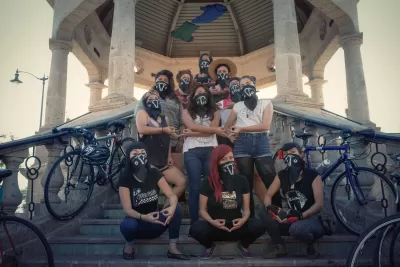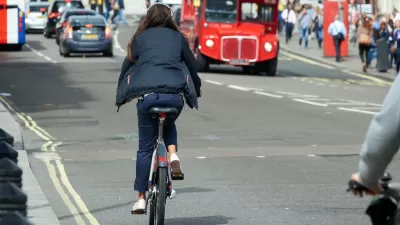The first in a series profiling grassroots activism to increase biking among the diverse populations of Los Angeles County. In this installment, we spoke with Karen Díaz, a core member of the Ovarian Psycos bicycle brigade.

The first in a series profiling grassroots activism to increase biking among the diverse populations of Los Angeles County. In this installment, we spoke with Karen Díaz, a core member of the Ovarian Psycos bicycle brigade.
How was the Ovarian Psycos bicycle brigade founded?
The Ovarian Psycos were founded about four-and-a-half years ago by long-time community organizer Xela de la X. She wanted to get a bunch of women together to bicycle, so she gathered about ten women for the very first Luna Ride. They actually had a huge accident—a rider was taking a picture from her bike, hit a pothole and fell off, cracking her skull. She ended up in the ER, and everyone was really scared. They nicknamed it the Death Luna Ride.
But eventually she healed, and they realized there were a lot of women who wanted to come out and do these rides, but there was no space for them to get together. It was a lot of work to put these rides together, but the interest was there. So Xela called back a few women to meet up on a weekly basis. That's how it started—just a bunch of women who wanted to ride and who wanted to address issues within the community. It evolved from there, very grassroots at its core, with this idea to make a longstanding collective.
Today, we do an annual Clitoral Mass ride and monthly Luna rides. These rides are open to anyone who does not identify as a man, of any bicycling background, comfort level, or experience. A big part of it is getting riders comfortable with cycling and with gears. We're pretty proud that we've never left anyone behind. Our slogan is "it's not a race but we keep a pace."
What are some of the goals the Ovarian Psycos are striving to achieve?
There are a lot of things that have changed since the Ovas came to be. For one, we have a formal mission and vision. Our mission is that we are a womyn of color bicycling brigade, cycling for the purpose of healing our communities physically, emotionally, and spiritually, by addressing pertinent issues.
And the vision is that we envision a world where women of color are change agents, who create and maintain holistic health within themselves and in their respective communities for present and future generations.
What have been some of the significant changes the Ovarian Psycos have undergone that changed the way you operate and achieve your mission?
Last year, we acquired a space, named La Conxa, on the Eastside. La Conxa is not just for us to have meetings there and organize, but now we want to provide this space for the community. One of our goals is fundraising to keep it open. We are not an organization or non-profit; we are an autonomous group, so we're making sure we keep the space autonomous and away from corporate money.
So, with this new space, you're able to really solidify your roots within the community. What kinds of actions or ways are you engaging with the folks surrounding La Conxa?
Another way we provide this space for the community is through our programming. So far, we've been collaborating and sharing space with other collectives like Mujeres de Maiz, Comidas no Bombas, and ACRAS, to name a few. We've also organized movie nights, including post-screening discussions with the filmmakers, and we've hosted bands and held fundraisers.
One of the things we really push for as well is encouraging women to learn bicycle mechanics. In these mechanic nights, we invite women, trans, gender non-conforming, basically anyone who doesn't identify as a man, to come in and learn bicycle mechanics. Because as women cyclists, bicycle mechanics are heavily needed for you to be autonomous and not rely on anyone else to fix your bike.
In addition, we're trying to address some of the issues going on in our communities, like gentrification, displacement of residents, and militarized policing, through programming in space and also in the Luna Rides. Each of our monthly full-moon Luna Rides revolves around a different theme. Usually at the end of the ride, we share a circle. A lot of personal and deep-rooted things come up. For most women, that first ride is really scary. But afterwards we see women progress and feel more comfortable and trusting of the space, and they really open up. It encourages women to be change agents in their communities and share what is going on there with the other riders in the circle. The first step in becoming a change agent is knowing yourself as a person and having the courage to speak up about those kinds of things.
But we have limited capacity, nobody gets paid to be part of the collective, everyone is either a student, a mother, or working class. Many of us are from low-income communities and need to work full time. But nonetheless, we're able to put on these bike mechanic training nights, safety trainings, and rides centered on issues in the neighborhood with elements of education.
As a collective that has a deep roots and strong understanding of its place and purpose within the community now, what's next for the Ovarian Psycos? How do you see the collective growing?
For one, at the end of this month, we'll be rolling out a fundraising campaign. We learned this the hard way, so now we're creating this campaign that can run on its own in the background and allow us to focus more of our energies on programming rather than fundraising.
But we've been running an Etsy store for a while now and it is cool to be shipping off t-shirts and merchandise to people all around the country, and even to places like Mexico, Argentina, and France. There is a lot of interest in what we've been doing here in L.A. I know that women in Chicago and Washington D.C. are also doing Luna Rides, so that's cool to ride under the same moon as them. In the future, we hope that we are able to expand the Ovarian Psycos mission as chapters in other cities as well.
Of course, we're always working on providing more resources for the community and expanding our workshops.

Alabama: Trump Terminates Settlements for Black Communities Harmed By Raw Sewage
Trump deemed the landmark civil rights agreement “illegal DEI and environmental justice policy.”

Study: Maui’s Plan to Convert Vacation Rentals to Long-Term Housing Could Cause Nearly $1 Billion Economic Loss
The plan would reduce visitor accommodation by 25% resulting in 1,900 jobs lost.

Planetizen Federal Action Tracker
A weekly monitor of how Trump’s orders and actions are impacting planners and planning in America.

Wind Energy on the Rise Despite Federal Policy Reversal
The Trump administration is revoking federal support for renewable energy, but demand for new projects continues unabated.

Passengers Flock to Caltrain After Electrification
The new electric trains are running faster and more reliably, leading to strong ridership growth on the Bay Area rail system.

Texas Churches Rally Behind ‘Yes in God’s Back Yard’ Legislation
Religious leaders want the state to reduce zoning regulations to streamline leasing church-owned land to housing developers.
Urban Design for Planners 1: Software Tools
This six-course series explores essential urban design concepts using open source software and equips planners with the tools they need to participate fully in the urban design process.
Planning for Universal Design
Learn the tools for implementing Universal Design in planning regulations.
Caltrans
Smith Gee Studio
Institute for Housing and Urban Development Studies (IHS)
City of Grandview
Harvard GSD Executive Education
Toledo-Lucas County Plan Commissions
Salt Lake City
NYU Wagner Graduate School of Public Service






























